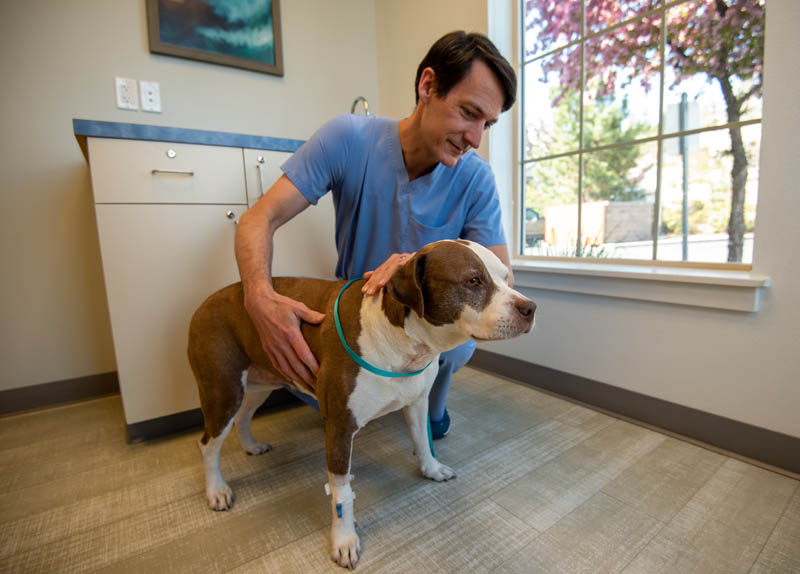Inflammatory Bowel Disease in Dogs and Cats
Inflammatory Bowel Disease in Dogs and Cats

In a recent Facebook Live video, Dr. Jennifer Bentley sat down with veterinary internal medicine specialist Dr. Matt Vaughan of Veterinary Referral Center of Central Oregon to talk about inflammatory bowel disease in dogs and cats. IBD involves inflammation of the wall of the intestine, possibly due to an intolerance of intestinal bacteria or as a reaction to antigens. Dr. Vaughan weighed in on how vets diagnose IBD, and how it can be treated.
What are the symptoms of IBD in dogs and cats?
IBD develops most often in young to middle-aged dogs and cats. IBD is associated with four primary symptoms. Signs your dog or cat may have inflammatory bowel disease include:
• Chronic vomiting
• Chronic diarrhea
• Poor appetite
• Weight loss
Dogs and cats don’t need to be experiencing all of these symptoms for IBD to be considered. Typically, pets with IBD exhibit one or two of these conditions.
How do vets diagnose inflammatory bowel disease in cats and dogs?
While it’s difficult to directly diagnose IBD in pets, a number of tests will help to rule out other serious, non-intestinal diseases. Your regular vet will likely do a blood panel to scratch liver and kidney disease off the list. At VRCCO, a full diagnostic work up can include a blood test to gauge the level of absorption in the intestine, as well as an ultrasound of the abdomen. While an ultrasound does not provide a definitive diagnosis of IBD, it can expose intestinal tumors, pancreatitis, and show where there is thickening of the intestines.
The most effective way to diagnose inflammatory bowel disease in a dog or cat is with a biopsy of the intestine. The endoscopic surgery is an anesthetic procedure, says Dr. Vaughan, and can be expensive. It’s not usually the first step on the diagnostic path, as blood work and an ultrasound can provide enough useful information to embark on a treatment plan.
Managing IBD Through Diet
As with allergies that affect the skin, certain foods can irritate the intestine and cause an inflammatory reaction. Pet owners may ask: what can I feed my dog with inflammatory bowel disease?, or what’s safe to eat for my cat with inflammatory bowel disease? Again, the answers are not one size fits all. The good news is, a food trial can help identify if food is playing a part in the disease. The largest obstacle to a successful food trial occurs when well-meaning owners supplement their pets’ food with something tempting like bacon scraps or chicken. For the trial to provide useful results, meals must be strictly limited to the prescription diet prescribed. Dr. Vaughan says it’s never a wrong move to do a food trial if your pet is vomiting, has diarrhea, or is losing weight or interest in food, as long as blood work has been done to eliminate the possibility of other diseases. Results from a food trial are usually determined within two to four weeks.
Treatment for IBD can include medication. Your vet can discuss the pros and cons of different medications for inflammatory bowel disease for your dog or cat.
Living with IBD
The question of how to manage inflammatory bowel disease in your pet has no easy answers, but take heart: often the condition can be successfully managed with diet. If your dog or cat is losing weight, vomiting, or has persistent diarrhea, see your vet to rule out causes such as kidney or liver disease. If IBD is suspected, you and your pet can move on to treatment options that help that intestine calm down and allow your cat or dog to feel better. In many cases, a prescribed diet may do the trick.


